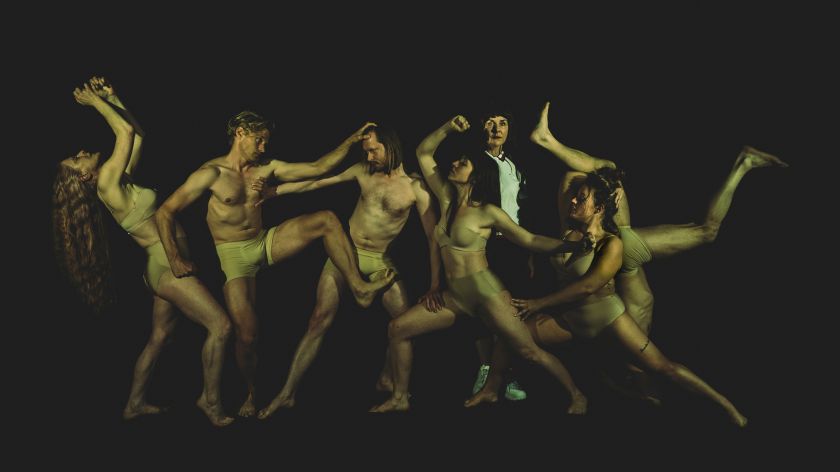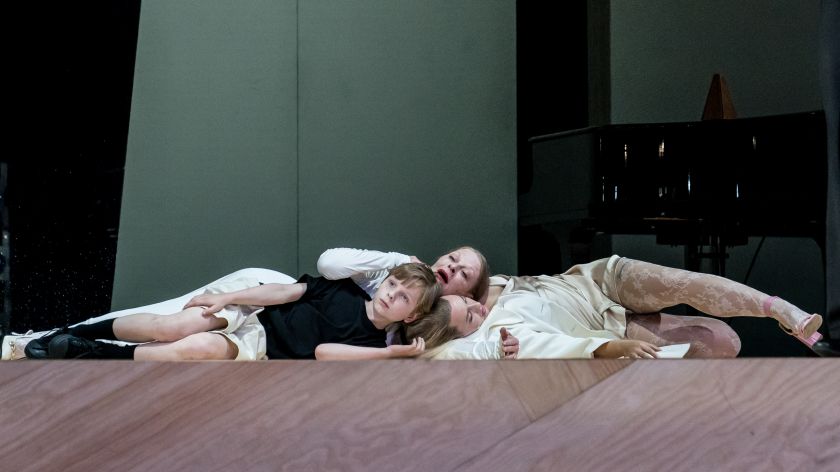„Zu Haus und in dem Kriege herrscht der Mann,
Und in der Fremde weiß er sich zu helfen.
Ihn freuet der Besitz, ihn krönt der Sieg, Ein ehrenvoller Tod ist ihm bereitet. Wie eng gebunden ist des Weibes Glück!“
Beim griechischen Tragödiendichter Euripides, im 4. Jahrhundert vor Christus, ist Iphigenie das perfekte Opfer. Böse getäuscht vom Vater Agamemnon wird sie nicht mit dem Helden Achilles verheiratet — und willigt am Ende in ihre eigene Opferung ein, damit günstige Winde wehen und der große Krieg gegen Troja beginnen kann. Die Göttin Artemis rettet Iphigenie von der Schlachtbank — dafür muss sie jedoch lange Jahre weit weg von Zuhause im Land der Taurer als Priesterin dienen. Von dort schickt Johann Wolfgang von Goethe sie 1779 als Frau in den Kampf um Humanität. Dass sie sich und ihren Bruder Orestes retten kann, verdankt sie bei Goethe nicht nur der Überzeugungskraft des deutschen Idealismus, sondern auch den Gefühlen, die sie bei Thoas, dem König der Taurer, weckt.
Durch die Zeiten hinweg bleibt Iphigenie eine Projektionsfläche: Eine Frau rettet den Vater — und das ganze griechische Volk, indem sie sich selbst opfert. Eine Frau, die weibliche Güte und Vergebung verkörpert, sich gegen den Krieg und für die geistige Stärke des Menschen ausspricht, die den ewigen Kreislauf der Rache (denn Schicksal ist keine Bestimmung!) unterbricht und als nachsichtige und vorausschauende Humanistin in die Geschichte eingeht.
Die Autorin Joanna Bednarczyk und die Regisseurin Ewelina Marciniak wollen mit ihrer modernen Interpretation der Iphigenia an aktuelle Diskurse anknüpfen. Sie nutzen die Folie von Euripides und Goethe, um eine eigene, eine zeitgemäße Geschichte zu erzählen. Wer könnte die junge Frau Iphigenia heute sein? Wer ist die Frau hinter dem Mythos, hinter der kollektiven Erzählung der Geopferten? Und wie befreit man sie aus dieser Erzählung?
Das Theater beschäftigt sich seit 2500 Jahren mit der Familie, mit Menschen, die sich nur zu gut kennen und aneinander gebunden sind — durch Umstände, die sie nicht selbst gewählt haben. Und das Theater beschäftigt sich auch heute, wie zu Zeiten Sophokles’ und Euripides’, mit der Familie als einer gefährlichen Zusammenballung gegenseitiger Abhängigkeiten und abgründiger Konflikte. Wie könnte es also heute aussehen, wenn ein Vater das Leben seiner Tochter opfert?
Im Zentrum der Neuinterpretation steht ein jahrelang verschwiegener Missbrauch des Onkels Menelaos an seiner Nichte. Als Iphigenia endlich die Kraft findet, das Schweigen zu brechen, ist sie mit einem Vater konfrontiert, der — als Ethikprofessor — gerade ein Buch über die Perversionen im Moralsystem von Tätern sowie Zweifel bei Opfern veröffentlicht und seinen Bruder Menelaos nicht anklagen will: um das eigene Ansehen, die Karriere und den guten Ruf der Familie nicht aufs Spiel zu setzen. Iphigenia sieht sich auch einer Mutter gegenüber, die sie auffordert, die Situation zu ertragen und das Leid nicht ihr Leben dominieren zu lassen. Sie ist einer Familie ausgesetzt, die sämtliche Strategien von Verdrängung, Verleugnung, Verschleierung und Verharmlosung durchläuft — und daran letztendlich zerbricht. Iphigenia ist mit einem System konfrontiert, das (männliche) Täter schützt und eine gewisse gesellschaftliche Toleranz der Gewalt (gegenüber Frauen) zeigt.
Iphigenia ist eine junge, außerordentlich talentierte Pianistin, der eine große internationale Karriere bevorsteht. Ihr Onkel Menelaos missbraucht sie; sie wird zum Opfer sexueller Gewalt — und vom Vater nochmals für Ruf und Karriere geopfert. Als Iphigenia jegliches Gefühl für den Sinn verloren geht, opfert sie letztendlich — wenn auch gezwungenermaßen als Folge der Ereignisse — ihre Zukunft als Starpianistin und ihre Liebe zu Achilles.
Der Missbrauch des Onkels und der Verrat des Vaters führen im Ansatz der Inszenierung zu einer Spaltung der Figur der Iphigenia in ein gegenwärtiges Ich und ein „erwachsen gewordenes“ Alter Ego: eine Instanz, die mit einer reflektierteren und emanzipierteren Perspektive auf das Geschehen blickt und dieses immer wieder unterbricht. Sie ist jene Iphigenia, die auf die Leerstelle verweist, die aus einer Figur hervorgeht, die jahrhundertelang in sämtlichen Bearbeitungen männlicher Autoren als Projektion diente und auch die anderen weiblichen Rollenkonstruktionen — jene der Klytaimnestra und der Helena — sowie ihre Abhängigkeiten innerhalb eines patriarchalen Systems infrage stellt.
Iphigenia entscheidet sich dazu, ihr Zuhause zu verlassen. Sie geht auf eine Insel. Nach etwa 20 Jahren trifft sie dort auf ihren Bruder Orestes, der sich — wie in der Vorlage der griechischen Mythologie — des Muttermordes schuldig gemacht hat. Iphigenia hadert mit dem Gefühl der Menschlichkeit und dem Willen zur Wahrheit; sie steht zwischen der Liebe zum Bruder und einer ambivalenten Sehnsucht nach Familie, zwischen der Pflicht, den Muttermörder verurteilen zu müssen, und der mythologischen Aufladung, die ewige Gewaltspirale durchbrechen und vergeben zu wollen. Anstatt sich zwischen den Interessen anderer (Männer) zu verlieren, befreit sich Iphigenia von den Erwartungshaltungen und der Kompromissbereitschaft — und besinnt sich radikal auf sich selbst.
Mit Iphigenia in der Neuinterpretation von Joanna Bednarczyk und Ewelina Marciniak entsteht eine moderne Untersuchung über Gewalt und Moral, über die Widersprüche der eigenen inneren ethischen Maßstäbe, deren Fragilität und Verhandelbarkeit, über die Frage, wen wir warum verurteilen. Aber vor allem ist sie ein Versuch, die Figur von Opfer-Zuschreibungen zu befreien, der Versuch, eine Emanzipation aus dem Opfer-Dasein zu denken — ohne dabei die Strukturen zu verleugnen, die Frauen auch heute oft in eine Opfer-Position drängen.


